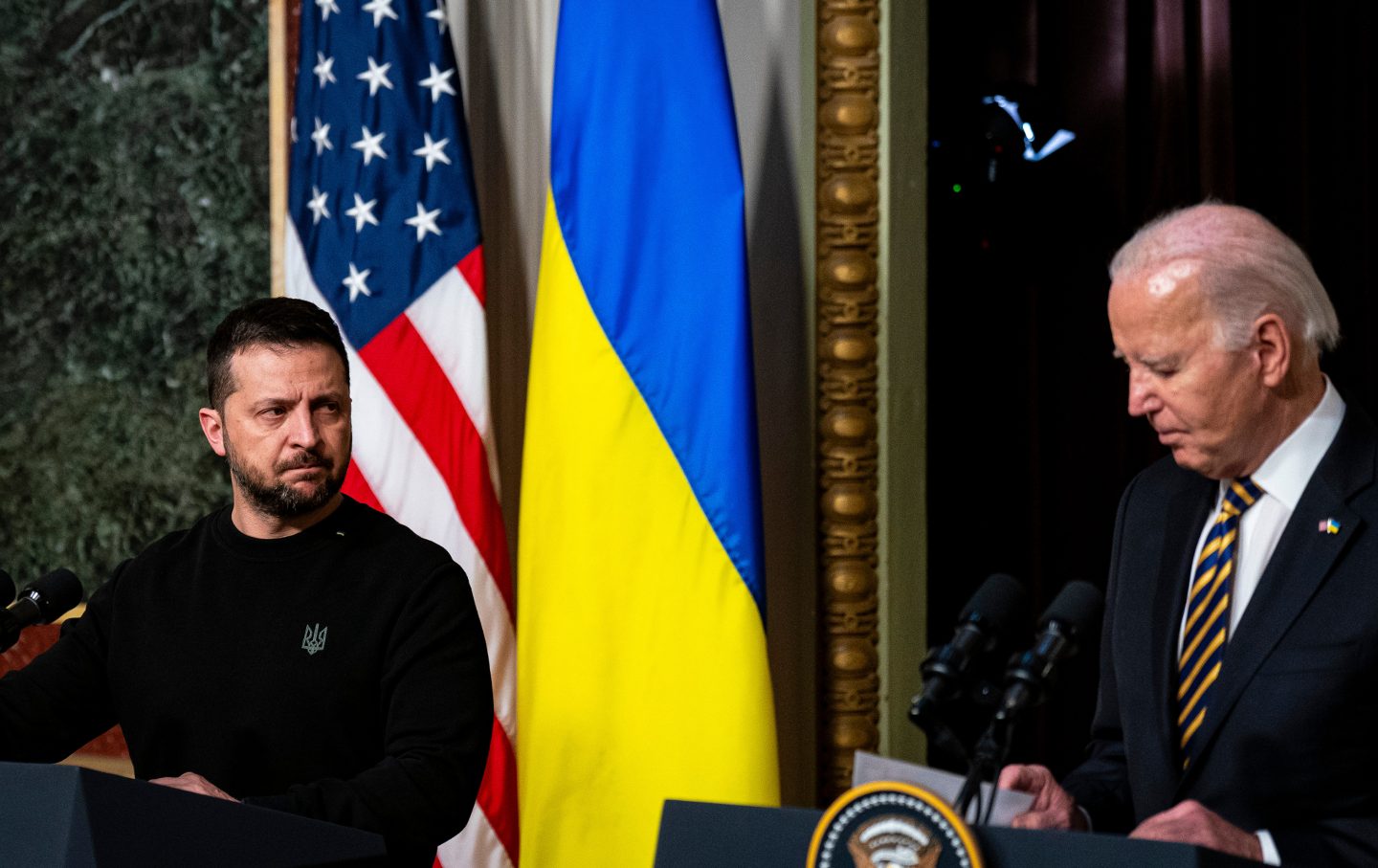Ukraine and the End of Magical Thinking
Time for reassessment and a change of course.

US President Joe Biden, right, and Ukrainian President Volodymyr Zelensky during a news conference in the Indian Treaty Room on the White House complex, in Washington, D.C., on Tuesday, December 12, 2023. Zelenskiy came to Congress today to appeal for more aid to resist Russia’s invasion, and Republican leaders told him to first wait for an elusive US deal on immigration.
(Al Drago / Bloomberg / Getty Images)In early November, Ukraine’s top general, Valerii Zaluzhnyi admitted that the war with Russia was at a stalemate. In December, Republicans in the US House of Representatives torpedoed the Biden administration’s request for billions in new military assistance to Ukraine. At the European Union, Hungary vetoed desperately needed monetary assistance. President Biden’s mantra that the allies would support Ukraine “as long as it takes” became a pledge to support the country “as long as we can.” From Europe, a stalwart Ukraine supporter, Lithuania’s Foreign Minister Gabrielius Landsbergis reported that “apparently as long as it takes means as long as we can agree.” Clearly, the time of magical thinking is over.
Ukraine’s startling early success in repelling the Russian attempt to take Kiev produced widespread euphoria. Russia’s military was exposed as incompetent and bumbling. The US mobilized its allies to provide arms and support and impose harsh sanctions on Putin. NATO was galvanized and expanded. Putin would be handed a defeat without NATO troop involvement. As the noxious Lindsay Graham put it, “Russians are dying” as Ukrainians fight “to the last person,” so aid to Ukraine is “the best money we’ve ever spent.” Sanctions would isolate and bankrupt Russia. China, Iran, North Korea and other adversaries would learn that aggression doesn’t pay. Putin might even be deposed and hauled before the International Criminal Court. In little more than a year, the US alone rushed $75 billion in largely military aid to Ukraine, a sum nearly as great as the entire annual Russian military budget.
That was then. Now as another harsh winter descends, the much-ballyhooed Ukrainian “offensive” has failed. With China, India and much of the Global South stepping in, Russia’s economy has rebounded from the sanctions. Putin has geared up for a long war. Ukraine, the second-largest country in Europe, is locked in a war of attrition with a country that is bigger, with more people, more troops, more artillery, and control of the air. The Pentagon, we’re told, has plans to increase production of 155 million artillery shells from 30,000 per month to 90,000 or 100,000 in 2025. Russia is headed toward generating 2 million a year.
Russia, according to a US intelligence estimate, lost a stunning 87 percent of its active-duty military in the first months of the war. But Ukraine’s losses have been nearly as great and not as sustainable. It is running out of men, guns, and ammunition. Its economy is battered. Over 20 percent of its people have been displaced, including 6.3 million refugees. It is estimated that it will take 757 years to rid the country of the mines now strewn across the countryside. The price tag for rebuilding is estimated to be north of $400 billion.
With NATO at its side, Ukraine can possibly hold out. But the problem with a proxy war is that war fever is hard to sustain without lives at risk. The administration’s sales pitch has grown more and more shrill—from “Russia will collapse quickly,” to “using Ukraine to weaken Russia is a cheap investment,” to “if Russia wins, US men and women will end up fighting them in Europe to aid to Ukraine is a job program at home,” to (as former Trump national security adviser Fiona Hill puts it), Putin is fighting to “remove the United States from the world stage.”
Enough. It is time for a sober reassessment. In the end, Barack Obama got it right nearly a decade ago. When the Russians entered Crimea after the 2014 coup against an elected Ukrainian leader who was sympathetic to Russia, Obama rejected plans to get involved militarily, arguing that “the fact is that Ukraine, which is a non-NATO country, is going to be vulnerable to military domination by Russia no matter what we do.” The Mexicans have a saying—“Poor Mexico, so far from God and so close to the United States.” Ukraine shares that same fate with neighboring Russia. Rather than providing the West with a proxy force to weaken Russia, it had to find a way to coexist with its bigger, more powerful neighbor.
A Way Out
After the casualties and destruction, no settlement will be easy. Both sides have good reasons not to trust the other. Putin’s speeches decrying the breakup of the Russian empire stoke fears that he will use any settlement to reload for the next target. Former German chancellor Angela Merkel’s admission that the West used the Maidan accords to buy time to build up the Ukrainian military gives Putin good reason to question any new agreement.
Putin clearly intends to consolidate Russia’s hold on Crimea and the Donbas region, if not more. No Ukrainian government would survive if it acceded to Russia’s land-grab. Ukraine needs massive aid in rebuilding its country. Putin has little appetite to bear the cost of the destruction that his invasion has created.
Yet both sides have reason to explore a cease-fire. The damage and casualties inflicted on Ukraine can’t be sustained. Outgunned and outmanned, with its allies distracted and faltering, it can only lose more ground and suffer more destruction in a war of attrition. Putin has announced plans to wage the war through 2026, expanding the territory that he claimed, leaving Ukraine a much diminished rump state. He won’t give up Crimea, with its warm water ports. He’ll demand that Ukraine become a neutral state and stay out of NATO. He’ll certainly want to incorporate much if not all of the Donbas into Russia.
Yet Putin has a real stake in a settlement, one that doesn’t stoke furies that lead to constant terrorist attacks. He’ll want an end to sanctions and an agreement on the damage claims around Ukraine’s ruin. The stability he would desire couldn’t be had without a settlement that sticks.
What’s clear is that any continued support for Ukraine must be tied to a serious exploration of a negotiated settlement with the Russians. That requires a reassessment and a change in course and moving toward negotiations, a cease-fire, and reconstruction—not the continued war of bloody attrition, the senseless killing and fighting to the last Ukrainian in the hope that Putin will collapse.
Disobey authoritarians, support The Nation
Over the past year you’ve read Nation writers like Elie Mystal, Kaveh Akbar, John Nichols, Joan Walsh, Bryce Covert, Dave Zirin, Jeet Heer, Michael T. Klare, Katha Pollitt, Amy Littlefield, Gregg Gonsalves, and Sasha Abramsky take on the Trump family’s corruption, set the record straight about Robert F. Kennedy Jr.’s catastrophic Make America Healthy Again movement, survey the fallout and human cost of the DOGE wrecking ball, anticipate the Supreme Court’s dangerous antidemocratic rulings, and amplify successful tactics of resistance on the streets and in Congress.
We publish these stories because when members of our communities are being abducted, household debt is climbing, and AI data centers are causing water and electricity shortages, we have a duty as journalists to do all we can to inform the public.
In 2026, our aim is to do more than ever before—but we need your support to make that happen.
Through December 31, a generous donor will match all donations up to $75,000. That means that your contribution will be doubled, dollar for dollar. If we hit the full match, we’ll be starting 2026 with $150,000 to invest in the stories that impact real people’s lives—the kinds of stories that billionaire-owned, corporate-backed outlets aren’t covering.
With your support, our team will publish major stories that the president and his allies won’t want you to read. We’ll cover the emerging military-tech industrial complex and matters of war, peace, and surveillance, as well as the affordability crisis, hunger, housing, healthcare, the environment, attacks on reproductive rights, and much more. At the same time, we’ll imagine alternatives to Trumpian rule and uplift efforts to create a better world, here and now.
While your gift has twice the impact, I’m asking you to support The Nation with a donation today. You’ll empower the journalists, editors, and fact-checkers best equipped to hold this authoritarian administration to account.
I hope you won’t miss this moment—donate to The Nation today.
Onward,
Katrina vanden Heuvel
Editor and publisher, The Nation
More from The Nation

Mahmood Mamdani’s Uganda Mahmood Mamdani’s Uganda
In his new book Slow Poison, the accomplished anthropologist revisits the Idi Amin and Yoweri Museveni years.

The US Is Looking More Like Putin’s Russia Every Day The US Is Looking More Like Putin’s Russia Every Day
We may already be on a superhighway to the sort of class- and race-stratified autocracy that it took Russia so many years to become after the Soviet Union collapsed.

Israel Wants to Destroy My Family's Way of Life. We'll Never Give In. Israel Wants to Destroy My Family's Way of Life. We'll Never Give In.
My family's olive trees have stood in Gaza for decades. Despite genocide, drought, pollution, toxic mines, uprooting, bulldozing, and burning, they're still here—and so are we.

Trump’s National Security Strategy and the Big Con Trump’s National Security Strategy and the Big Con
Sense, nonsense, and lunacy.

Does Russian Feminism Have a Future? Does Russian Feminism Have a Future?
A Russian feminist reflects on Julia Ioffe’s history of modern Russia.

Ukraine’s War on Its Unions Ukraine’s War on Its Unions
Since the start of the war, the Ukrainian government has been cracking down harder on unions and workers’ rights. But slowly, the public mood is shifting.


